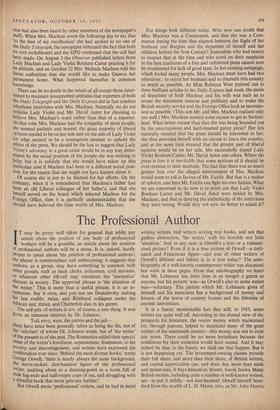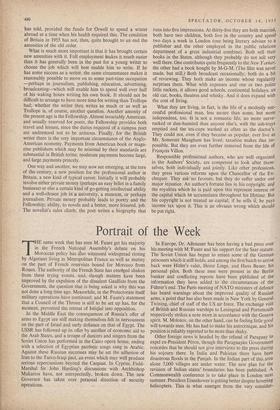The Professional Author
IT may be pretty well taken for granted that while any article about the position of any body of professional workers will be a grumble, an article about the position of professional authors will be a moan. It is, indeed, hardly Proper to speak about 'the position of professional authors'; the phrase is commonplace and unbecoming; it suggests that authors, as a group, may have something in common with Other groups, such as bank clerks, policemen, civil servants, or whatever other riff-raff may constitute the 'uncreative' element in society. The approved phrase is 'the situation of the writer.° This is more than a useful phrase; it is an in- cantation. Say it once, and you can see Dostoievsky staking his last rouble; twice, and Rimbaud collapses under the African sun; thrice, and Chatterton dies in his garret.
The self-pity of writers is not, of course, a new thing. It was given an immense impetus by Dr. Johnson : Toil, envy, want, the patron and the jail— these have since been generally taken as being the ills, not of the 'scholars' of whom Dr. Johnson wrote, but of 'the writer' of the present as of the past. The Romantics added their special sense of the writer's loneliness, separateness, frustration, to his Poverty and discouragement, and writers have expressed the Combination ever since. 'Behind the most diverse books,' wrote George Orwell, 'there is nearly always the same background, the nerve-racked, dun-haunted figure of the professional writer, padding about in a dressing-gown in a room full of stale fag-ends and half-empty cups of tea, and struggling with a dreadful book that never gets any further.' But Orwell wrote 'professional' writers, and he had in mind writing writers, real writers writing real books, and not that gutless abstraction, 'the writer,' with his horrible wet little `situation.' And in any case, is Orwell's a true or a romanti- cised picture? Even if it is a true picture of Orwell—a dedi- cated and Franciscan figtire—and true of other writers of Orwell's lifetime and before it, is it true today? The auto- biography of a well-known contemporary writer was discussed last week in these pages. From that autobiography we learn that Mr. Lehmann has done time in as meagre a garret as anyone, but his poverty was—as Orwell's also to some extent was—voluntary. The picture which Mr. Lehmann gives of himself and his associates has a background of money and leisure, of the lawns of country houses and the libraries of ancient universities.
It is a barely mentionable fact that still, in 1955, some writers are quite well off. According to the dismal view of the prospects for literature, the rentier money which maintained (or, through patrons, helped to maintain) many of the great writers of the nineteenth century—this money was not to exist any more. There could be no more leviathans because the conditions for their existence would have ceased. And it may indeed be that, in the future, we shall see that happen. But it is not happening yet. The 'investment-owning classes provide their full share, and more than their share, of British writers, and capital appreciation can, and does, buy more than mink and motor-cars. It buys education, leisure, travel, books. Many British writers, including quite a number of well-known writers, are—to put it mildly—not dun-haunted. Orwell himself bene- fited from the wealth of L. H. Myers, who, as Mr. John Morris has told, provided the funds for Orwell to spend a winter abroad at a time when his health required this. The cdndition of Britain in 1955 has not, then, quite brought to an end the amenities of the old order.
What is much more important is that it has brought certain new amenities with it. Full employment Makes it much easier than it has generally been in the past for a young writer to choose the job which will best enable him to write. If he has some success as a writer, the same circumstance makes it reasonably possible to move on to some part-time occupation —perhaps in journalism, publishing, education, advertising, broadcasting—which will enable him to spend well over half of his waking hours writing his own book. It should not be difficult to arrange to have more time for writing than Trollope had; whether the writer then, writes 'as much or as well as Trollope is, of course, another question. Another amenity of the present age is the Fellowship. Almost invariably American, and usually reserved for poets, the Fellowship provides both travel and leisure, since the duties required of a campus poet are understood not to be arduous. Finally, for the British writer there is the very important circumstance of the Anglo- American economy. Payments from American .book or maga- zine publishers which may be minimal by their standards are substantial in British terms; moderate payments become large, and large payments princely.
One way and another, we may now see emerging, at the turn of the century, a new position for the professional author in Britain, a new kind of typical career. Initially it will probably involve either private money (perhaps an easy billet in a family business) or else a certain kind of go-getting intellectual ability and a well-chosen job in a university, a museum, or perhaps journalism. Private money probably leads to poetry and the Fellowship; ability, to novels and a better, more leisured, job. The novelist's sales climb; the poet writes a biography that runs into five impressions. At thirty-five they are both married, both have two children, both live in the country and spend two days a week in London (one being literary adviser to a publisher and the other employed in the public relations department of a great industrial combine). Both sell their books in the States, although they probably do not sell very well there. One contributes quite frequently to the New Yorker; the other had a book bought by M-G-M. (The film was never made, but still.) Both broadcast occasionally; both do a bit of reviewing. They both make an income whose regularity surprises them. What with expenses and one or two polite little rackets, it allows good schools, continental holidays. an old car, books, theatres and whisky. And it does expand with the cost of living.
What they are living, in fact, is the life of a modestly suc- cessful professional man, less secure than some, but more independent, too. It is not a romantic life, no more nerve- racked or dun-haunted than anyone else's, with the ash-trays emptied and the tea-cups washed as often as the doctor's. They could not, even if they became as popular, ever live as Mr. Somerset Maugham has lived; taxation makes that im- possible. But they are even further removed from the life of Francois Villon.
Responsible professional authors, who are well organised in the Authors' Society, are competent to look after them- selves, both individually and jointly. Like other professions, they press 'various reforms upon the Chancellor of the Ex- chequer. They ask 'no favours, but they do suffer under one major injustice. An author's fortune lies in his copyright, and the royalties which he is paid upon this represent interest on the capital which he accumulates throughout his lifetime. But his copyright is not treated as capital; if he sells ii, he pays income tax upon it. This is an obvious wrong which should be put right.











































 Previous page
Previous page